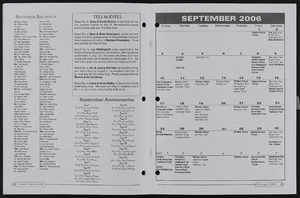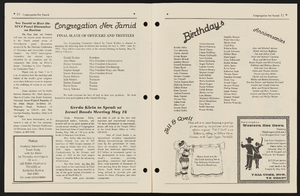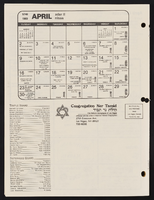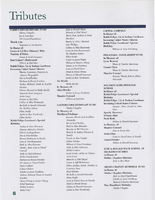Search the Special Collections and Archives Portal
Search Results

John Fudenberg oral history interview: transcripts
Date
Archival Collection
Description
Oral history interviews with John Fudenberg conducted by Barbara Tabach and Claytee D. White on May 3, 2018 and May 23, 2018 for the Remembering 1 October Oral History Project. In this interview, John Fudenberg, the coroner for Clark County in Las Vegas, Nevada, gives an account of his experience during the October 1, 2017 mass shooting on the Las Vegas Strip and what his role was during the tumultuous days after the shooting. He explains how he and the staff of the coroner's office prepared for the large number of casualties as well as their arrival at the Route 91 Harvest festival venue. Fudenberg speaks of setting up the Family Assistance Center at the convention center and how it supported the community but also aided the coroner's office in gathering information about the deceased and identifying them. Fudenberg discusses the main job of the Coroner's Office during the first week after the shooting, which was to autopsy the bodies and communicate with the families, as well as the Police Department. He also talks about the emotional impact the shooting and its aftermath had on him and his staff members and the wellness program they implemented, of which trauma yoga and meditation had a large impact.
Text

Transcript of interview with Vincent "Vince" Hart by Andrew Bannister, February 21, 1980
Date
Archival Collection
Description
On February 21, 1980, Andrew Bannister interviewed Vincent “Vince” Hart (born on July 7, 1945 in Jerusalem, Palestine) in Hart’s office about his experience with youth soccer, both as a coach and as a player. Hart discusses his family background and his residential history in the United Kingdom and the United States before explaining the development of the men’s soccer team at the University of Nevada, Las Vegas. He describes his impact on the program and his hopes for future student athletes. The two then delve into a discussion of the fundamentals of soccer and different strategies that are commonly used. They then conclude with a brief description of Vince’s experiences with meeting a variety of professional soccer players at the Las Vegas Stadium.
Text

Transcript of interview with Alice Ward Boyer by Joanne Goodwin, June 26, 1996
Date
Archival Collection
Description
Alice Ward Boyer arrived in Las Vegas from Oklahoma in 1937. Her brother and former husband came earlier to escape the dustbowl depression and get settled. In the middle of the summer, just at dusk, she emerged from the train at Kingman, Arizona with her two small children to meet her family and drive through the darkness to her new home in Las Vegas. Although she missed the trees of the Plains, she soon became accustomed to her desert home. Her recollections revive the older Las Vegas when community life characterized the small town. At the heart of her story is the Mesquite Club. The non-partisan civic activities of the Mesquite Club are part of a national history of women’s club voluntarism in the nineteenth and twentieth century United States. Founded in 1911, this pioneer Las Vegas women's club played an essential role in the development of the growing town. When few cultural or social services existed, the club raised funds for the first public library, developed parks for the city, and provided services and funding for the aged and youth. The Mesquite Club, along with the Parent Teacher Association, scouts, and church activities formed a network of community relations commonly found in developing towns and cities, but not ususally associated with Las Vegas. Alice Boyer joined the Mesquite club in 1944. She first served as the chair of the Garden Committee, then "went right up through the chairs," and was elected President of the club for 1958-59. (See Table of Offices Held). Speaking about the Mesquite Club founders, Alice Boyer said, “They were very forward-looking women. They knew that the town would grow and they wanted the best for the town.” As one of the second generation of members, she has found the club to be a continuing source of congenial social life and civic community building. Born in rural Oklahoma, she spent her early years on a ranch. Her parents met there shortly after "the run to open Oklahoma" around 1892. They met, married and had twelve children, nine of which survived. Alice came right in the middle. She spent her early years riding horses, wearing “overalls," and spending as much time as possible outside. The family moved into Clinton, Oklahoma for better schools for their children when she was in the fifth grade. Alice graduated from high school just as the Great Depression began and worked briefly at a newspaper before marriage. At the time of the interview, Alice Boyer’s vivaciousness, gracious manner, and sharp memory belied her 82 years. This interview has been produced with the assistance of the Mesquite Club and the History Department of the University of Nevada, Las Vegas. It is part of a series on women community builders in Las Vegas. The transcript has been edited only slightly for clarity while the syntax and style of the narrator were retained.
Text

Transcript of interview with John Acres by Stefani Evans and Claytee White, July 11, 2017 & September 28, 2018
Date
Archival Collection
Description
Visionary John Acres likes to use his engineering background and computer expertise to solve problems. He has sold more companies that most people ever form—Electronic Data Technologies, Mikohn Gaming, and Acres Gaming—and he still owns the Acres 4.0 and Gen Seven companies. The 2016 Inductee to the American Gaming Association and the University of Nevada Las Vegas Gaming Hall of Fame reshaped the gaming industry by inventing electronic player tracking, progressive jackpot systems, and loyalty programs. Each innovation focused on customer service—"what would the customer think; what would they like; what would really get them excited; what would get them to come back"—and harkened back to lessons taught him by Norman Little, manager of Mr. Sy's Casino of Fun and one of the first people to hire a teenaged John Acres. In this interview, Acres bookends his remarkable career in gaming with the customer service philosophy of Norman Little as the basis, culminating with solutions to enable g
Text

Transcript of interview with Walter Dane by Ann Clark, March 11, 1978
Date
Archival Collection
Description
On March 11, 1978, Ann K. Clark interviewed her step grandfather, tire repairman Walter Dane, (born August 10th, 1914 in West Barnett, Vermont) in her, the interviewer’s, home in North Las Vegas. Also present during the interview is the interviewer’s mother, Marie Dane. Walter relocated to Indian Springs in 1930 before settling in Las Vegas in 1943. In 1968 he moved to Utah, where he resided at the time of this interview. Well-traveled, Walter discusses his many moves over the years. Ultimately, this interview covers the growth and development of the Las Vegas and Indian Springs areas.
Text
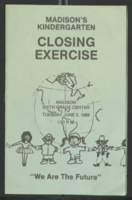
Mabel Hoggard: community interest materials (folder 2 of 3)
Date
Archival Collection
Description
Folder of materials from the Mabel Hoggard Papers (MS-00565) -- Personal papers file. This folder contains event programs, "Going For The Gold: The Story of Black Women in Sports" booklet by Ken Bently (a gift to J. David & Mabel W. Hoggard, not digitized in its entirety), "Pictorial Souvenir Book of the Pennsylvania State Federation of Women's Clubs, Inc." (not digitized in its entirety), and Alpha Kappa Alpha Sorority Theta Theta Omega Chapter 1988 "BLAC-tivities" calendar.
Mixed Content

